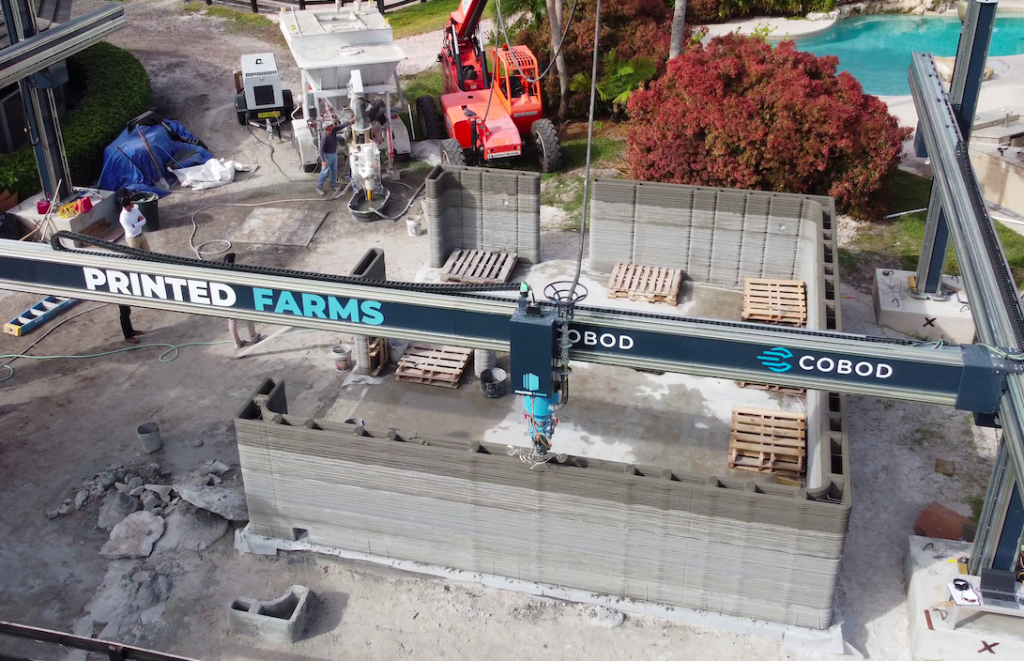There’s been a flurry of activity in the construction 3D printing sector, as prefab producer Mighty Buildings, education non-profit Thinking Huts, and Floridian start-up Printed Farms have all made progress within their printed building businesses.
Mighty Buildings has raised $40 million via a Series B funding round led by Khosla Ventures and Zeno Ventures. The funds will be used to accelerate its growth and expand its team. Elsewhere, Thinking Huts has partnered with architecture firm Studio Mortazavi to design a lifesize 3D printed school, which it aims to open in Madagascar later this year.
Printed Farms, meanwhile, has utilized Danish manufacturer COBOD’s construction 3D printer to erect Florida’s first fully-fabricated building. According to Printed Farms Co-Founder Fredrik Wannius, COBOD’s latest system could be disruptive within the construction sector by dramatically reducing costs and lead times.
“The construction industry is the world’s largest industry and one that has not been impacted by a technology revolution,” said Wannius. “Using COBOD’s 3D technology and BluePrintz, our innovative building method, we are aiming to significantly reduce the cost of building, and getting ready to put the system in the hands of contractors.”

Mighty Buildings fuels further growth
In addition to Khosla and Zeno Ventures, Mighty Building’s latest funding round has been backed by three existing investors and more than seven new ones, reflecting the traction it has gained since leaving stealth mode last year. The investment also takes the firm’s total capital raised to $70 million and lifts it into Y Combinator’s list of companies by valuation.
Using the additional funding, Mighty Buildings intends to continue its expansion, building on its team, production capacity, and automation capabilities. The company is also creating a sustainability-focused B2B developer platform, and the investment will help it to achieve its vision of providing production-as-a-service to architectural clients.
Additionally, having delivered and installed multiple Accessory Dwelling Units (ADUs) over the last five months, Mighty Buildings is now taking pre-orders for its new ‘Mighty Houses.’ The prefab units, which feature 3D printed shells, are available in three, four, and five-room variants, and measure between 864 and 1440 sq. ft.
“We’re pleased to support Mighty Buildings in realizing their vision,” said Ryno Blignaut, Operating Partner at Khosla Ventures. “We’re enthusiastic about the ways 3D printing, robotics, and automation can be applied to the creation of beautiful, affordable, and sustainable net-zero energy homes.”

Thinking Huts hatches schooling plan
American philanthropist and Founder of Thinking Huts, Maggie Grout, has teamed up with Studio Mortazavi designers to conceptualize an entirely-3D printed school. To turn her idea into reality, Grout has also partnered with concrete 3D printing firm Hyperion Robotics, and she aims to complete construction and open its doors by December 2021.
The school is set to be built on the university campus of the Ecole de Management et d’Innovation Technologique (EMIT) in the Madagascan city of Fianarantsoa and will be open to children of all ages. Given that it’s designed to be the first of many, the prototype will only be built using locally-sourced materials, to make it as sustainable as possible.
Initial plans for the school include secure doors and windows and features like solar panels and internet access. Once the production process has been perfected, Grout intends to expand on the $350,000 pilot project by constructing at least three more buildings in areas where educational resources are scarce.
Printed Farms achieves Florida first
Finally in this spate of additive construction news, Printed Farms has announced that it has finished fabricating the first 3D printed building in Florida. Measuring 784 sq. ft, the rebar-reinforced storage unit has been signed-off by a structural engineer, and the firm is now seeking permission to create two additional Floridian intercoastal villas.
Printed Farms is a start-up that’s entirely dedicated to producing hurricane and flood-resistant green buildings in Florida. In order to achieve this, the company has adopted COBOD’s proprietary BOD2 3D printer, which enables it to fabricate highly complex structures, including buildings with 2,000 sq. ft floors over three storeys.
COBOD’s technology has been utilized in a similar way by the PERI Group before, to 3D print a three-floor apartment block, and GE Renewable Energy to create record-breaking wind turbine towers. According to COBOD Founder Henrik Lund-Nielsen, the BOD2’s European success could now pave the way for greater adoption in the U.S.
“In the BOD2 printer, we have a market-ready product proven over more than two years, which has made record projects in Europe,” said Lund-Nielsen. “The BOD2 printer was also used to print the world’s first concrete windmill tower for GE, so we are very confident that this printer will satisfy the needs of the US market.”
To stay up to date with the latest 3D printing news, don’t forget to subscribe to the 3D Printing Industry newsletter or follow us on Twitter or liking our page on Facebook.
Are you looking for a job in the additive manufacturing industry? Visit 3D Printing Jobs for a selection of roles in the industry.
Featured image shows Printed Farms’ Floridian house in the process of being 3D printed. Photo via COBOD.


